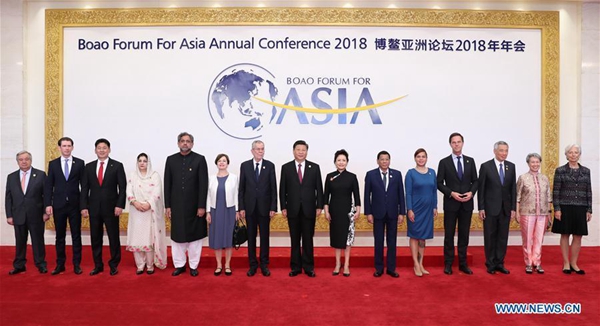Boao: The forum Nepal shouldn't have missed
- By Saroj Gautam
 0 Comment(s)
0 Comment(s) Print
Print E-mail China.org.cn, April 24, 2018
E-mail China.org.cn, April 24, 2018
When KP Sharma Oli visited Rasuwagadhi, a very strategic border area between China and Nepal, immediately after the provincial and federal elections even before he was appointed PM, there was an impression that he was gesturing a significant shift in foreign policy. There was even speculation he might start his trip abroad in Beijing instead of Delhi, because he'd been called a pro-China leader for his defiance against the Indian blockade. However, Nepal's absence at the Boao Forum for Asia (BFA) has lead to people having the opposite opinion.

During the inauguration of BFA in 2001, Nepal's then King Birendra Bir Bikram Shah was invited as a special guest. While thanking King Birendra, then Chinese President Jiang Zemin said that the presence of Nepal's head of the state at the forum added prestige to it. Oli as PM himself and his successor Puspa Kamal Dahal Prachanda were the special guests at BFA in 2016 and 2017, respectively.
BFA is taken as an alternative world forum, one under the helm of Chinese leadership. As a founding member of the forum, Nepal hadn't missed it until this year. The importance given to Nepal during BFA 2018 was remarkable as there was a Nepali flag waving throughout the session.
Nepal's absence in the forum has been a matter of debate within Oli's CPN UML party. Senior UML leader Madhav Kumar Nepal, who was in Beijing while Oli was busy in Delhi, criticized the absence.
It is said that the Chinese side had wanted Oli to join BFA directly from Delhi, but Nepal's cold response resulted in the total absence of Nepal's government in the forum. Former Nepali ambassador to China, Tanka Karki, blames it on Indian influence. "I don't know whether it is an intentional act but India has been successful this time in stopping Nepal from participating in the BFA."
During a joint press conference with Nepali counterpart Oli at Hyderabad House, Indian PM Narendra Modi pointed out the development projects in Nepal that South Block thinks India is losing to China. It was clear that Modi government is desperate to give an impression via all possible avenues that Nepal's only infrastructure development partner is India.
Modi, who had imposed a blockade on Nepal just a year earlier, has proposed the "Raxaul-Kathmandu Rail" project as a substitute for "Kerung-Kathmandu" rail. And his expression "Sagarmatha to Sagar" (from Mt. Everest to the Sea) for Nepal demonstrates Delhi's Sino-phobia because it is in reaction to the Transit Trade treaty, which ends dependency on India and allows Nepal to use Chinese ports to trade goods with third countries. If he had the genuine desire, Oli could have flown to Hainan from Delhi and had a meeting with Xi Jinping during the same week he met Narendra Modi. Thus BFA was the best platform for Oli to practically prove his promise of "balanced neighborhood policy."
According to political analyst Bishnu Sapkota, Oli chose Delhi instead of BFA because he is desperate to mend relations with India.
The Oli-led government has been talking about economic prosperity and claims to have been creating a conducive environment for external investment in the country. But it ignored the fact that the BFA is a forum of world investment giants. Companies investing in China from across the globe, including Indians, were present at the forum. In the inauguration ceremony of BFA-2018, Chinese President Xi Jinping said that the Belt and Road Initiatives (BRI) may be China's idea but its opportunities and outcomes are going to benefit the world. Xi's remark is an effort to deconstruct the discouraging discourses based on speculation that BRI projects push recipient countries into debt. Xi's speech reflects that as a signatory of the BRI, the importance of the forum for Nepal has increased.
The diplomatic community keenly watched Oli's first abroad trip. But by being absent from BFA the "strongest government in decades" missed an opportunity to promote itself and set a new image for the country in the international political arena. Intention can't be questioned, but Nepal's absence from BFA-2018 was viewed poorly in China. As a world power, China may understand our limitations, but under Oli's leadership Nepal has missed a historical opportunity.
Saroj Gautam writes on International Relations and Diplomacy from Kathmandu. Gautam is associated with AP1HD Television in Nepal. Follow him on twitter- @gautam_sarose
Opinion articles reflect the views of their authors, not necessarily those of China.org.cn.






Go to Forum >>0 Comment(s)